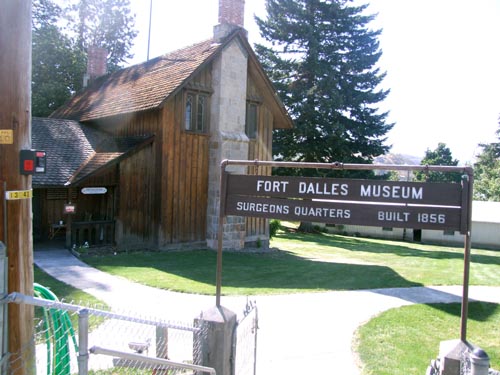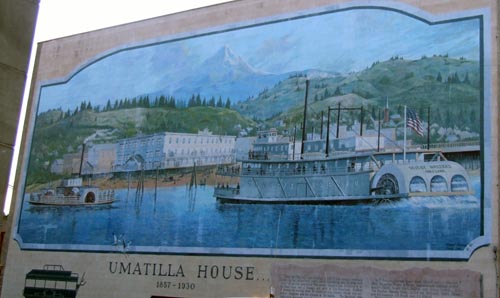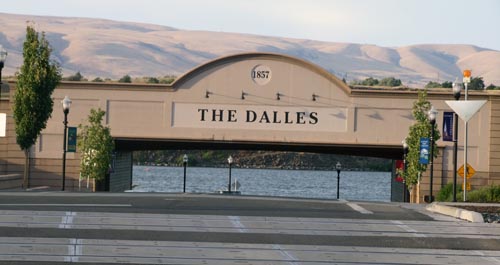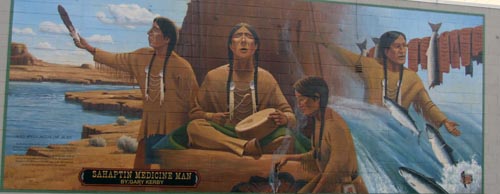-Nineteenth in a Series —
By Donald H. Harrison

THE DALLES, Oregon — Today, there are few Jews living in this city, but it is not surprising that at one point in its history, Jewish merchants found it a very attractive place to do business.
“The Dalles” was given its name by French Canadian traders. The name describes a place where the face of the stone mountains come right to the river’s edge, on both sides of the river, forming a steep chute-like canyon which no wagon with its team of horses or oxen could negotiate without falling into the river.
During the 1840’s, as migrants made their way west on the Oregon Trail, this was the place that if people were traveling by wagon train, they had to swing south to the Barlow Road on a long detour that skirted Mount Hood, or transfer the contents of their wagons to boats. Once on the river, they could continue their westward journey via the Columbia River toward Portland and the Pacific Coast.
The U.S. Army built a fort here in 1850, initially called Camp Drum, named for a popular Army officer who fought in the Mexican and American War, Simon H. Drum. By 1857, acquiescing to the popular French-Canadian name, the Army built more permanent structures, renaming the facility as Fort Dalles. Initially, the role of the fort was to help the westward-bound settlers on their journey, perhaps trading the settlers’ worn out oxen for Army owned oxen, freshened by the readily available forage. The army’s surgeon, who occupied one of the four buildings at the fort, dispensed medical care.
“They just wanted the people out of here, because this area was not open for settlement; this was Indian country,” commented Paula Kuttner, director of the Fort Dalles Museum and wife of one of the few Jews currently living in The Dalles, Lawrence Kuttner.

Well before Jewish and other merchants of European stock arrived at The Dalles, Native Americans recognized it as an important trading place. While the trading post was within the territory traditionally recognized as belonging to the Wasco Indians, there were numerous representatives of other tribes here, including the Sahaptin peoples, looking to trade. Goods found or made on the inland plains were traded for the goods and trading items of the Pacific Coast. Today, The Dalles is the seat of Wasco County. Meanwhile, the Wasco were moved to the Confederated Tribes of Warm Spring Reservation of Oregon.
The pressure on the U.S. Army and the politicians to whom it answered to allow Americans to settle along the Columbia River was overwhelming. The Army’s mission changed from helping settlers to transit the area to forcing Indians to move to reservations and thus clear the way for settlement.
On our western North America tour, my Grandson Shor and I had come across the name of George Wright, the commanding officer at Fort Dalles, before, at an Army installation that was named for him at our last stop, in Spokane, Washington, where today the Mukegawa Fort Wright Institute teaches Japanese
college students about America and the English language.
According to Kuttner, the infamous episode in which Wright ordered his soldiers to slaughter the captured horses of the Native Americans– an act for which he was never forgiven by the indigenous people — could be looked at not only as an act of barbarism. “Since he could not feed the horses, or care for the horses, and he didn’t dare turn them loose, which would be like giving an Army back its tanks and airplanes, they shot the horses, which was pretty awful. That is part of war. Rather than slaughter the people, they slaughtered the horses.”
By the mid 1850’s, the Native Americans had been forced onto the reservations, and The Dalles was open to American trade and settlement. Kuttner said that at least one wife of a mid 19th century Army officer made a snide remark, to be found in a book of her collected letters, about “the Jew merchants down in The Dalles.”
Prof. Ellen Eisenberg, the Dwight & Margaret Lear Professor of American History at Willamette University, told me in e-mail correspondence that, as in almost every western town, Jewish merchants played a role early in the history of The Dalles, but no Jewish community, as such, was developed.
She noted that in a history compiled by Steve Lowenstein about Oregon Jews, The Dalles was mentioned relatively few times. Lowenstein identified the city “as one of several sites in Oregon where some of the Solomon brothers operated a retail business (although the bulk of their activities were in the Willamette Valley); as the starting point of the stagecoach/mail operation of Bernard Goldsmith (later mayor of Portland) during the Civil War; and as the site of one of Henry Heppner’s stores (founder of Heppner, Oregon). Heppner ran a pack train out of The Dalles also in the 1860s.”
According to an historic mural at the place where the Umatilla House once stood, that hotel, completed in 1857, boasted a reputation as “the finest hotel west of Chicago and north of San Francisco … It became the meeting place for steamboat men, miners, sheep and cattlemen, freighters and the citizens of The Dalles. The barroom was elaborately decorated and often stocked as much as 2,500 gallons of whiskey and was the scene of many high stake card games.”

Among the hotel’s famous visitors, according to the mural, were U.S. President Ulysses S. Grant, General William Tecumseh Sherman, inventor and Mrs. Thomas Edison, author Rudyard Kipling, boxers John L. Sullivan and James “Gentleman Jim” Corbett, U.S. Vice President Schuyler Colfax, and humorist Mark Twain.
Among a succession of owners, Irish immigrants Daniel Handley and Nicholas Byrne Sinott stood out as being among the kindest to their lodgers.
On the website Historic The Dalles, one finds the following anecdote about Sinott and Handley: “Stories tell of, in the early days, a Hebrew peddler arrived in The Dalles with his pack. He was exhausted from his long tramp, and failure to dispose of his goods soon left him penniless, sick and hungry. He appealed to Colonel Sinnott, who took him in. When he was ready to depart he offered the Colonel all the money he had, about six dollars, in part payment of his account of about twenty dollars.
“Sinnott refused it and sent him away. A few weeks later, having been more fortunate, the peddler remitted the amount in full and the Jew passed out of the Colonel’s thoughts. Two days after the fire that almost wiped The Dalles out of existence in 1891, Colonel Sinnott received a message from New York stating. ‘Wait for letter,’ signed ‘Blumenthal.’
“With impatience the Colonel waited for the arrival of the letter, which came in due time. It stated that the writer had read in the press dispatches of The Dalles fire and presumed that the hotel burned was the Umatilla House. If so, the writer desired the Colonel to apply to him for what money he needed and to use six figures if necessary. The letter went on to state that the writer was the Hebrew peddler whom the Colonel had assisted. He had worked himself
up to the head of an extensive manufacturing enterprise. It was said that Sinnott and Handley wept upon reading his telegram.
“Sinnott replied that his hotel had not been burned and that he was not financially distressed. Mr. Blumenthal then replied that he stood ready to assist him at any time, and that he would give any sum that he might need.’”
According to the Jewish Genealogical Society of neighboring Washington State, Sigmund Schwabacher from Zimdorf, Bavaria, worked for his uncle in The Dalles at the trading firm of Black (possibly Bloch) and Miller before going into business in Washington with his brothers and brother-in-law. He became a director of the 280-mile long Seattle to Walla Walla Railroad, and later still became president of Schwabacher Brothers Company of San Francisco.
Another Jew who passed through The Dalles was Marcus Oppenheimer, a merchant who arrived by wagon train in 1862. He pushed on to the State of Washington, where eventually the town of Marcus was named for him, according to a posting of the online Jewish Museum of the American West.
From approximately 1860 to 1964, there had been a small Jewish cemetery adjacent to the Pioneer Cemetery in The Dalles, but with the community becoming too small to maintain it, a decision was made to re-inter those buried there at a Jewish cemetery in Portland.
The Jewish community of The Dalles was further reduced in 2006, when Robert Paul, a former Peace Corps volunteer in Kenya, who became part of the U.S. Army’s programs to rebuild infrastructure first in Iraq and later in Afghanistan, was killed when an improvised explosive device exploded near his Humvee. Forty-three years old at the time of his death, he had written occasional columns from Afghanistan for The Dalles Chronicle.
_________________________________________________________________________________________________________
If you go: We stayed at The Dalles Inn, which offers a swimming pool, fitness center, wi-fi and a complimentary continental breakfast. Getting some of the city’s old town flavor, we had dinner nearby at the Baldwin Saloon and restaurant, which is filled with curios and antiques, including a cash register with a crank that opens three drawers. On a platform above the dining area where an entertainer tickles the ivories of an 1894 Schubert piano, playing old time songs. There are oil paintings by such California artists as Edgar Martin Keller and Astley David Middleton Cooper as well as landscape oils by Joseph J. Englehart.
_________________________________________________________________________________________________________
*
Harrison is editor of San Diego Jewish World. He may be contacted via donald.harrison@sdjewishworld.com


Pingback: Roseburg founder long mistaken for a Jew - San Diego Jewish World